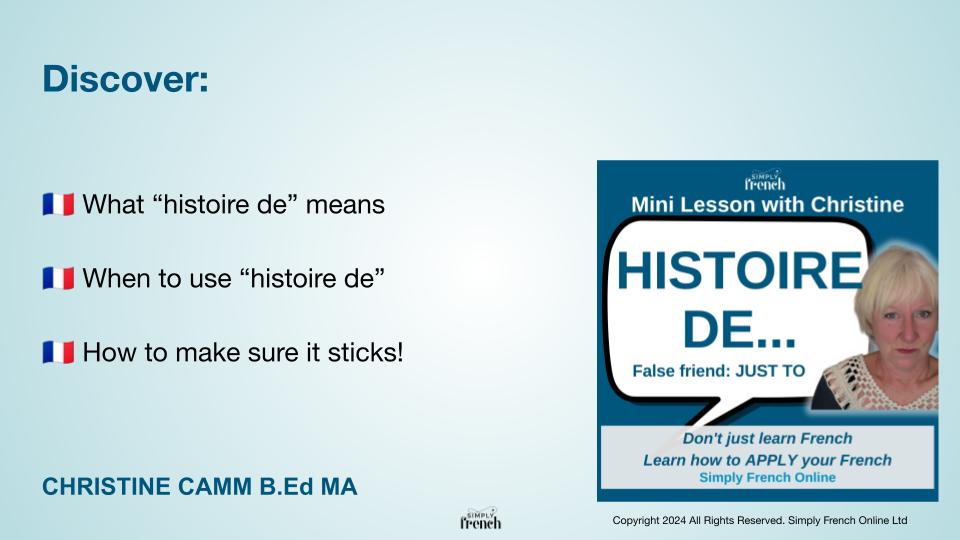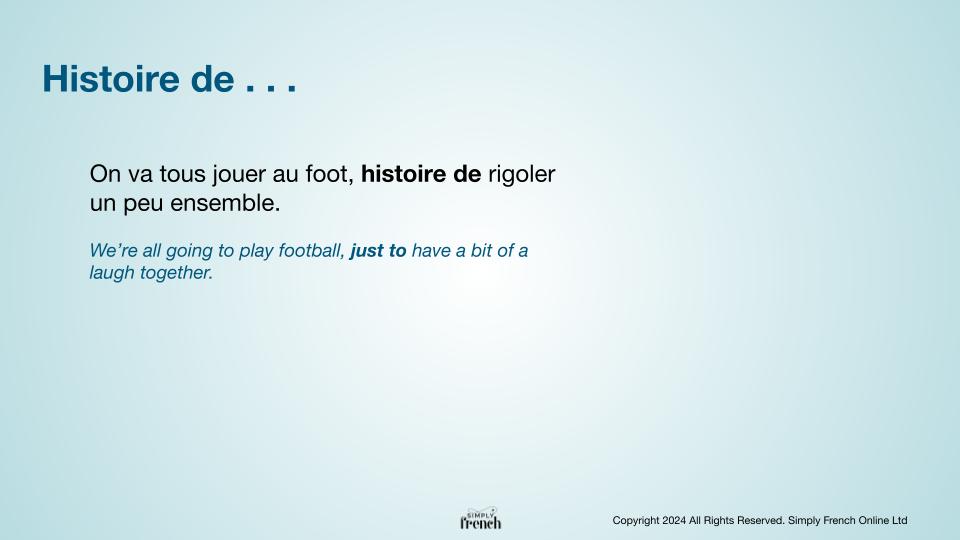What “histoire de” means in French
Jul 29, 2024“Just to” see if you fancy squeezing in a nice new expression to your French head. . .
I present you . . . “Histoire de . . .”
“Just to” . . .
This is a really quick mini-lesson to help you enjoy being just a little bit more French today, instead of saying “juste pour”.
Don’t make schoolday errors with “histoire de” It’s a false friend!
Make your quick discovery in this helpful mini-lesson:
- What “histoire de” means
- When to use “histoire de”
- How to make sure it sticks!

What “histoire de” means.
First, the word “histoire” means story. However, the expression “histoire de” signifies “in order to” but in a less formal way.
You could even say that it’s a substitution of “pour” (for). In this case, it would be colloquial. In a nutshell, histoire de is used when you talk.
In addition, you could see the subjunctive after a similar expression: “histoire que”.

The French expression “histoire de” with an infinitive.
When it comes to say or write “histoire de”, you always have it with an infinitive after.
As a reminder, an infinitive is the version of your verb that is not conjugated.
- histoire de + infinitive
In the following parts, you will understand how it works…

The French expression “histoire de” in practice.
First, simply add an infinitive after the structure like this:
- On va tous jouer au foot, histoire de rigoler un peu ensemble. >>> We’re all going to play football, just to have a bit of a laugh together.
Here are the common endings of French infinitives:
- er >>> aimer, parler, travailler, étudier, voyager…
- ir >>> finir, choisir, partir, avoir…
- re >>> faire, mettre, prendre, être

Let’s play with another example:
- Allons voir ce film, histoire de se détendre un peu ce soir. >>> Let’s go see this movie, just to relax a bit this tonight.

Here’s another one:
- Je vais faire un peu de rangement dans ma chambre, histoire de mettre de l’ordre. >>> I’m going to tidy up my room a bit, just to put things in order.

I have another illustration:
- Je vais ajouter un peu de sel à la soupe, histoire de relever le goût. >>> Let’s I’m going to add a bit more salt to the soup, just to enhance the flavour.

And, finally:
- Pourquoi ne pas lui demander son avis, histoire de voir ce qu’il pense ? >>> Why not ask for his opinion, just to see what he thinks?

As you can see, in each example, it’s just as if the person is trying to justify something…
Tips to learn the sounds more easily.
First, take these examples and make your own to suit your life and what you would say. That way, you’ll remember them more easily.
Then, check your creation is correct. If you’re lucky to know a native speaker, grab the opportunity.
Practice reading out loud. Don’t stay with the idea that you know how to say it without doing it aloud. The best thing you could do would be to record your voice and listen to it after to check. Even better, get instant feedback from a native speaker.
Make a stimulus prompt and put it up at random places and touch it as you pass it, saying it out loud. Anything that triggers your memory is welcome!
Change the words a little. The more you adapt it, the more your brain is processing it.
Finally, as you speak, visualise or feel to help it stay in your long-term memory.

How to use “histoire de” in French.
We saw several examples with this expression in order to justify something each time. Simply remember to add an infinitive after it and you will be good.
The following FREE masterclass is available to you to guide you through being able to speak French with confidence. And if you speak with more confidence, you also hear more easily - really. Take a peek . . . https://www.simplyfrenchonline.com head for LEARN and then Masterclass.
Had you heard of “histoire de” before this mini-lesson?
Free Masterclass
Learn my 4 step method of how to hold meaningful french conversations the R.E.A.L. way in just 30 minutes a day.
When you signup, we'll be sending you weekly emails with additional free content

